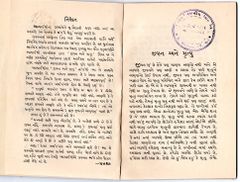Talk:Jivan Ane Mrtyu (જીવન અને મૃત્યુ): Difference between revisions
Jump to navigation
Jump to search
(@Sarlo and all) |
mNo edit summary |
||
| Line 9: | Line 9: | ||
The "excuse" for Osho's talks appears to be a "Dehwasan", for which, maddeningly, no translation can be found by yr editor. Should a reasonably Gujarati-literate reader who can help with this come along, drop us a line. -- [[User:Sarlo|doofus-9]] ([[User talk:Sarlo|talk]]) 07:37, 30 August 2019 (UTC) | The "excuse" for Osho's talks appears to be a "Dehwasan", for which, maddeningly, no translation can be found by yr editor. Should a reasonably Gujarati-literate reader who can help with this come along, drop us a line. -- [[User:Sarlo|doofus-9]] ([[User talk:Sarlo|talk]]) 07:37, 30 August 2019 (UTC) | ||
:I am native Gujarati. ''Dehavasan'' mean death. It is an Indian tradition to organise various remedies for peace of the soul of departed. These two public talks on "Life and Death" (જીવન અને મૃત્યુ) were organised by daughter-in-law Mrudulaben in respect of his died father-in-law Mr Chunilal Bhaichand Mehta. The book is also published with (financial) support of Mr Vinodbhai (son) and Mrudulaben (daughter-in-law) in memory of Chunilal Bhaichand Mehta (father) and (Tapiben Chunilal Mehta (mother). I hope | :I am native Gujarati. ''Dehavasan'' mean death. It is an Indian tradition to organise various remedies for peace of the soul of departed. These two public talks on "Life and Death" (જીવન અને મૃત્યુ) were organised by daughter-in-law Mrudulaben in respect of his died father-in-law Mr Chunilal Bhaichand Mehta. The book is also published with (financial) support of Mr Vinodbhai (son) and Mrudulaben (daughter-in-law) in memory of Chunilal Bhaichand Mehta (father) and (Tapiben Chunilal Mehta (mother). I hope this helps!-[[User:Nizil|Nizil]] ([[User talk:Nizil|talk]]) 14:43, 31 March 2022 (UTC) | ||
Revision as of 14:43, 31 March 2022

There appears to be no date or location info supplied in the pages of this book. The Publisher's Statement opposite the first page of the first discourse (left half of image, right) may provide the only clue about the circumstances of these two talks. A rough, and woefully inadequate, translation of the first two paragraphs goes like this:
- Statement
- Acharyashree's lectures do not require a reason. Yet it is important to know a lot about why these lectures were organized.
- The Indian tradition of performing various remedies for the peace of the soul is prevalent after the death of a spouse. A tribute to Heaven provides a beautiful sample and a welcoming entry, with Sir Chunilal Bhai Chand Mehta's Dehwasan organized by his son-in-law, Mr Mudulabhan being the occasion for Acharya Shri Rajneeshji's two public lectures on "Life and death".
The "excuse" for Osho's talks appears to be a "Dehwasan", for which, maddeningly, no translation can be found by yr editor. Should a reasonably Gujarati-literate reader who can help with this come along, drop us a line. -- doofus-9 (talk) 07:37, 30 August 2019 (UTC)
- I am native Gujarati. Dehavasan mean death. It is an Indian tradition to organise various remedies for peace of the soul of departed. These two public talks on "Life and Death" (જીવન અને મૃત્યુ) were organised by daughter-in-law Mrudulaben in respect of his died father-in-law Mr Chunilal Bhaichand Mehta. The book is also published with (financial) support of Mr Vinodbhai (son) and Mrudulaben (daughter-in-law) in memory of Chunilal Bhaichand Mehta (father) and (Tapiben Chunilal Mehta (mother). I hope this helps!-Nizil (talk) 14:43, 31 March 2022 (UTC)
